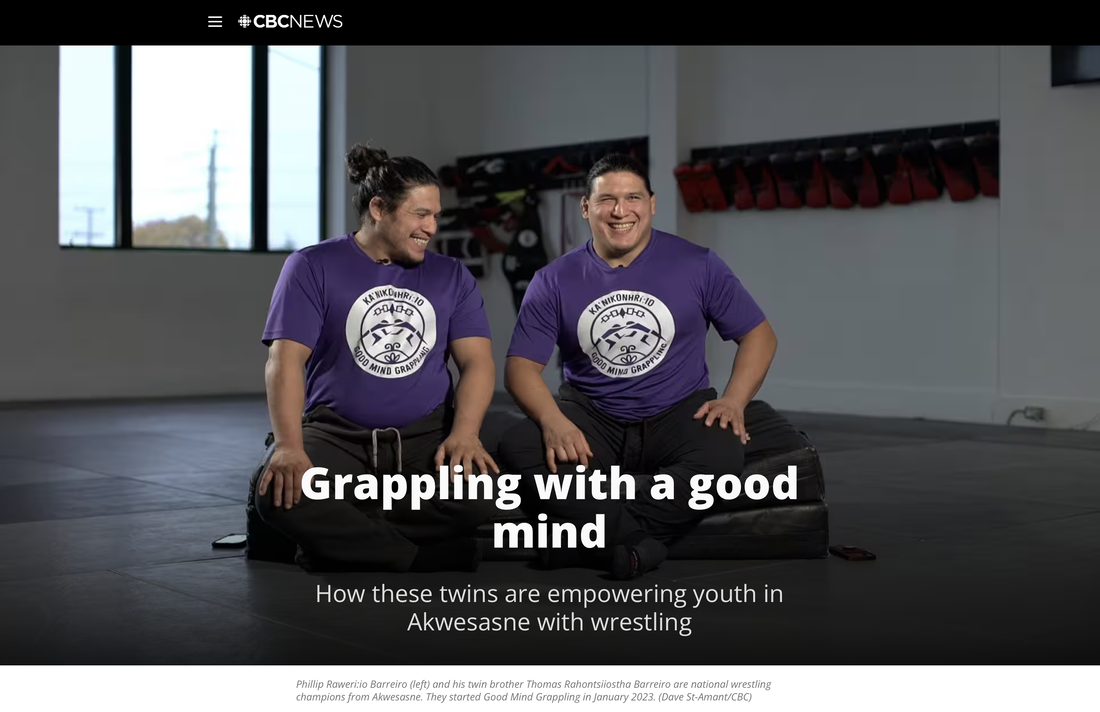|
Good Mind Grappling, a project for community youth at Akwesasne Mohawk Reserve, is featured this week in a national story by CBC News. Two Akwesasne based wrestling champions and youth educators, twins Phillip and Thomas Barreiro lead the project, which is housed at Plenty Canada.
(Akwesasne is a Kanien’kehá:ka (Mohawk) community that straddles the Quebec, Ontario and New York state borders). The CBC story, written for the national audience by Mohawk journalist, Ka’nhehsí:io Deer, describes the popular project: “In Kanien’kehá:ka teachings, kan’nikonhrí:io means to have a good mind clear from grief, anger, and sorrow to allow for decision-making and positive actions. “It’s the heart of what twin brothers Phillip Raweri:io and Thomas Rahontsiiostha Barreiro are practicing with a new initiative to empower youth in their community through what they know best: wrestling.” “The unique project incorporates sport in a creative and humanistic approach to youth development. CBC Indigenous visited the after-school program at Kana:takon School while a group of six-to-nine-year-olds learned basic gymnastics, tumbling play and task-oriented learning games.” The twin brothers founded Good Mind Grappling early in 2023. Combining the grappling arts with well-researched youth development, the project launched a six-week after-school program that ultimately involved over a 100 youth in Akwesasne. “The after-school program marks just the beginning of the work that the Barreiro brothers are doing. In the new year, they will be collaborating with others who are working in wrestling with both Indigenous and non-Indigenous youth.” The national champions competed in the NCAA Division 1 in American folk style for the American University in Washington, D.C. Coming back to their community after college, they trained in Montreal with Olympic-style Greco-Roman wrestling with Olympic coach Doug Yates. Writes CBC News reporter Ka’nhehsí:io Deer: “For the Barreiro twins, the programming is less about training the next generation of Olympians, and more about empowering youth for brighter futures. “‘I’m not a psychologist or a licensed counsellor,’” said Thomas. “What I am is a wrestler and a coach and a youth educator, and this is the way that my brother and I can participate in that greater process of healing our community.” Adds Phillip: “We don’t aim to necessarily build world champions competitively at wrestling; what we’re aiming to do is to build resilience factors in children so that they can be better people.” CBC News: “According to a Statistics Canada report released last year, almost four in 10 Indigenous people experienced childhood victimization and the odds of having experienced childhood victimization remained 1.5 times higher among Indigenous people relative to non-Indigenous people.” The overrepresentation is rooted in Canada’s history of colonization, according to the Truth and Reconciliation Commission. The placement of Indigenous children into residential schools and foster care have contributed to the intergenerational transmission of violence and trauma experienced by Indigenous children today. While you can’t undo those experiences, the Barreiro brothers say, “you can provide resilience factors like confidence, competence, and community through physical literacy and social and emotional development.” https://www.cbc.ca/newsinteractives/features/grappling-with-a-good-mind https://www.cbc.ca/newsinteractives/features/grappling-with-a-good-mind?fbclid=IwAR3F7-769u_H2T149Jud7xc1QNVbpeF1yf1_TBxSfSeI4MmUD1RB644xz2w
0 Comments
Your comment will be posted after it is approved.
Leave a Reply. |
|
-
Home
- Donate
-
Projects
-
Canada
>
- Niagara Escarpment Biosphere Network
- Great Niagara Escarpment Indigenous Cultural Map
- Greenbelt Indigenous Botanical Survey
- The Healing Places
- Indigenous Food Sovereignty
- Plenty Canada CampUs
- Two-Eyed Seeing Bird Knowledge
- Indigenous Languages and Cultures Programs >
- Wild Rice
- Good Mind Grappling
- Ginawaydaganuc Village
- Youth Programming >
- Caribbean >
- Central & South America >
- Africa >
-
Canada
>
- News
- Resources
- Partners
- Contact Us
Our LocationPlenty Canada 266 Plenty Lane Lanark, Ontario, Canada K1G 3P4 (613) 278-2215 |
Donate to Plenty Canada |
Subscribe to our Newsletter |


